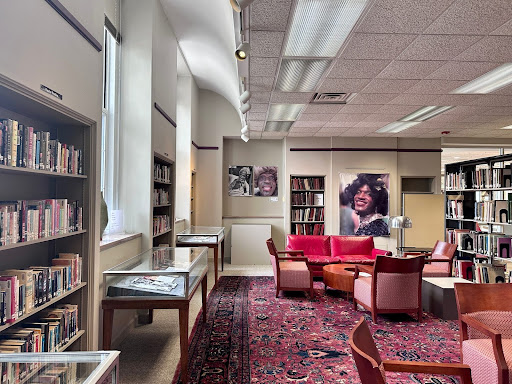The Faulkner Morgan Archive is a nonprofit organization that works to share Kentucky’s LGBTQ history. The archive was founded in 2014 and named in honor of two queer artists from Kentucky, Henry Faulkner and Robert Morgan. Starting in April, the Transylvania Library has been displaying an exhibit from the Faulkner Morgan Archive in the first-floor quiet section. Titled “Here, Black, Femme, and Queer,” it features images and stories of Black, femme, and queer Kentuckians.
Once you walk into the quiet section there are two large photographs of Marsha P. Johnson from the Estate of Leee Black Childers Collection at the Faulkner Morgan Archive. The plaque below the posters presents a brief history of Marsha’s life and impact on New York City and the queer community. Leee Black Childers, the photographer of the work, was born in Kentucky and worked throughout his career to highlight queer culture in his photographs. Beyond the large photos, there are many more stories that are presented in glass cases throughout the exhibit. The exhibit highlights the stories of amazing queer individuals, such as Lexington native Charles Dansby (Miss Joyce), who had a massive influence on Lexington’s queer community.
The exhibit spotlights many people who performed at what is now known as the Bar Complex here in Lexington. It was especially impactful reading about Sweet Evening Breeze, one of the only openly queer Black Kentuckians prior to the 1970s. Understanding both the negative and positive history of our city is undeniably vital. It is important and fulfilling to learn about the queer legends that came before us but also to acknowledge how the life they lived before has affected queer individuals today. The house of Sweet Evening Breeze, which witnessed her arrest and was vandalized during her lifetime, still stands here in Lexington and is a twelve-minute drive from our campus. You’ve probably seen her face before if you’ve ever been walking downtown on North Limestone, in the beautiful purple mural titled “Mother Of Us All.” To learn the many more stories of Black queer Kentuckians in the exhibit, stop by the library and learn about Lexington’s History.



